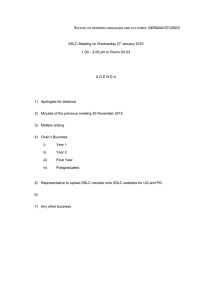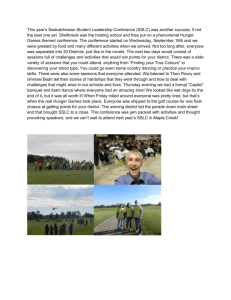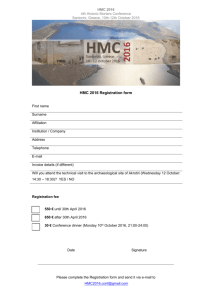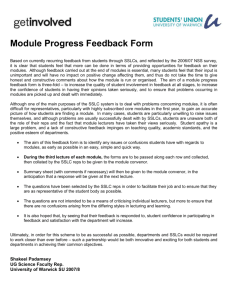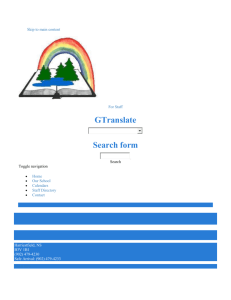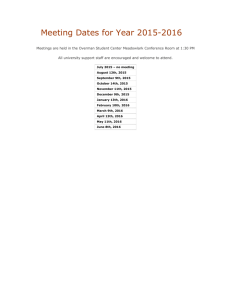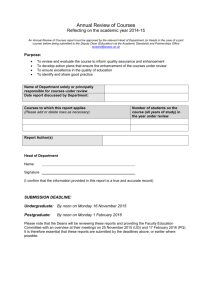UG Student Staff Liaison Committee (SSLC)
advertisement
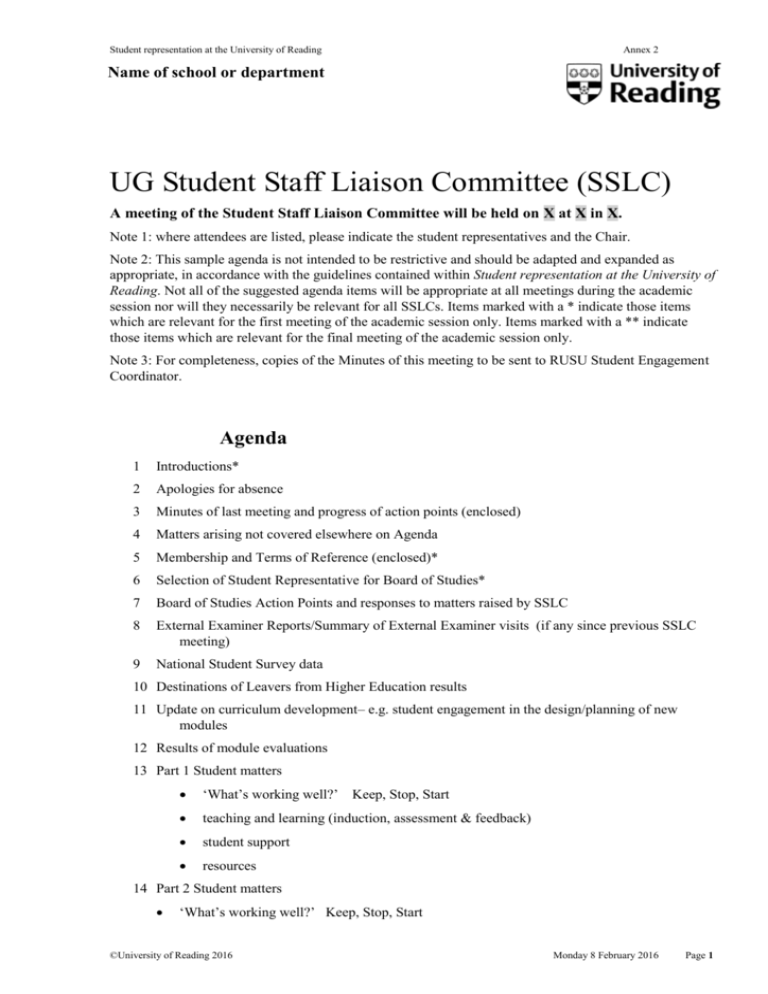
Student representation at the University of Reading Annex 2 Name of school or department UG Student Staff Liaison Committee (SSLC) A meeting of the Student Staff Liaison Committee will be held on X at X in X. Note 1: where attendees are listed, please indicate the student representatives and the Chair. Note 2: This sample agenda is not intended to be restrictive and should be adapted and expanded as appropriate, in accordance with the guidelines contained within Student representation at the University of Reading. Not all of the suggested agenda items will be appropriate at all meetings during the academic session nor will they necessarily be relevant for all SSLCs. Items marked with a * indicate those items which are relevant for the first meeting of the academic session only. Items marked with a ** indicate those items which are relevant for the final meeting of the academic session only. Note 3: For completeness, copies of the Minutes of this meeting to be sent to RUSU Student Engagement Coordinator. Agenda 1 Introductions* 2 Apologies for absence 3 Minutes of last meeting and progress of action points (enclosed) 4 Matters arising not covered elsewhere on Agenda 5 Membership and Terms of Reference (enclosed)* 6 Selection of Student Representative for Board of Studies* 7 Board of Studies Action Points and responses to matters raised by SSLC 8 External Examiner Reports/Summary of External Examiner visits (if any since previous SSLC meeting) 9 National Student Survey data 10 Destinations of Leavers from Higher Education results 11 Update on curriculum development– e.g. student engagement in the design/planning of new modules 12 Results of module evaluations 13 Part 1 Student matters ‘What’s working well?’ Keep, Stop, Start teaching and learning (induction, assessment & feedback) student support resources 14 Part 2 Student matters ‘What’s working well?’ Keep, Stop, Start ©University of Reading 2016 Monday 8 February 2016 Page 1 teaching and learning student support resources 15 Part 3 Student matters ‘What’s working well?’ Keep, Stop, Start teaching and learning student support resources 16 Part 4 Student matters ‘What’s working well?’ Keep, Stop, Start teaching and learning student support resources 17 Matters specific to Part time and Distance Learning students not already addressed 18 Students’ Union events/matters (e.g. training opportunities, Course Rep Conventions, RED Awards, Gold Star Awards) 19 Staff matters (e.g. programme aims and objectives, programme changes/developments, induction outcomes/managing transition to HE, research opportunities, careers meetings, work placements. student exchanges) 20 Health and Safety matters 21 Other matters student representatives wish to raise 22 Feedback on Student Representation ** 23 Any Other Business 24 Date of next meeting Student/Staff Liaison Committee Terms of Reference To provide a formal channel for students to meet with staff in order to discuss the operation of programmes; To keep under review the aims and objectives of the programmes; To review issues relating to teaching and learning, including assessment and feedback, module evaluation, curriculum development and student support; To receive and review copies of External Examiners’ reports; and To consider other matters including health and safety and resources such as equipment and library provision. ©University of Reading 2016 Monday, 08 February 2016 Page 2 Student representation at the University of Reading Annex 2 Name of school or department PG Student Staff Liaison Committee (SSLC) A meeting of the Student Staff Liaison Committee will be held on X at X in X. Note 1: where attendees are listed, please indicate the student representatives and the Chair. Note 2: This sample agenda is not intended to be restrictive and should be adapted and expanded as appropriate, in accordance with the guidelines contained within Student representation at the University of Reading. Not all of the suggested agenda items will be appropriate at all meetings during the academic session nor will they necessarily be relevant for all SSLCs. Items marked with a * indicate those items which are relevant for the first meeting of the academic session only. Items marked with a ** indicate those items which are relevant for the final meeting of the academic session only. Note 3: For completeness, copies of the Minutes of this meeting to be sent to RUSU Student Engagement Coordinator. Agenda 1 Introductions* 2 Apologies for absence 3 Minutes of last meeting and progress of action points (enclosed) 4 Matters arising not covered elsewhere on Agenda 5 Membership and Terms of Reference* 6 Selection of Student Representative for Board of Studies* 7 Board of Studies Action Points and responses to matters raised by SSLC 8 External Examiner Reports/ Summary of External Examiner visits (if any since previous SSLC meeting) 9 Postgraduate Taught Experience Survey data 10 Destinations of Leavers from Higher Education 11 Update on curriculum development – e.g. student engagement in the design/planning of new modules 12 Results of module evaluations 13 Student matters (repeated by School if necessary): • ‘What’s working well?’ Keep, Stop, Start • teaching and learning (induction, assessment & feedback) • student support • resources 14 Matters specific to Part-time and Distance Learning students not already addressed 15 Students’ Union events/matters or Graduate School matters ©University of Reading 2016 Monday 8 February 2016 Page 3 16 Staff matters (e.g. programme aims and objectives, programme changes/developments, induction outcomes, research opportunities, careers) 17 Health and Safety matters 18 Other matters student representatives wish to raise 19 Feedback on Student Representation ** 20 Any Other Business 21 Date of next meeting Student/Staff Liaison Committee Terms of Reference To provide a formal channel for students to meet with staff in order to discuss the operation of programmes; To keep under review the aims and objectives of the programmes; To review issues relating to teaching and learning, including assessment and feedback, module evaluation, curriculum development and student support; To receive and review copies of External Examiners’ reports; and To consider other matters including health and safety and resources such as equipment and library provision. ©University of Reading 2016 Monday, 08 February 2016 Page 4
